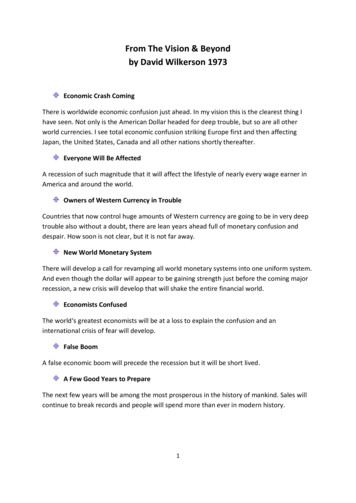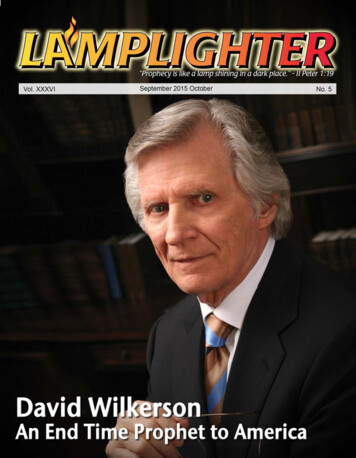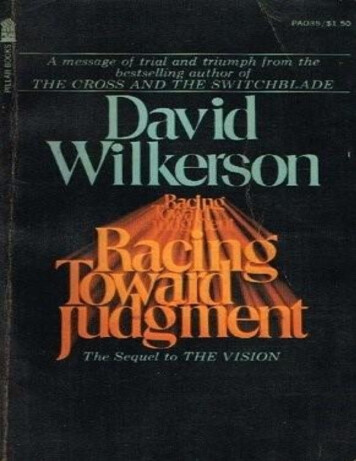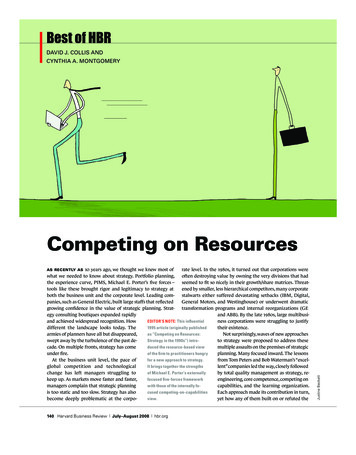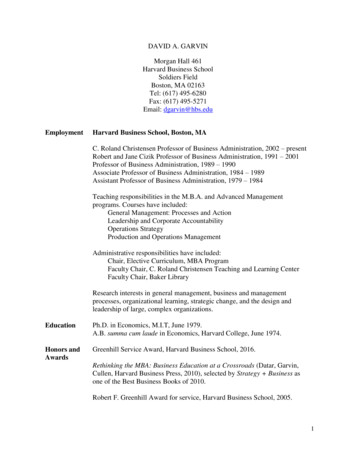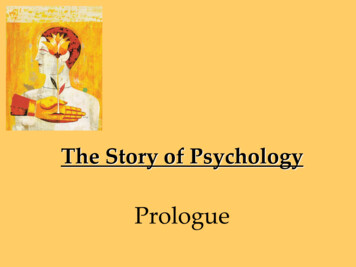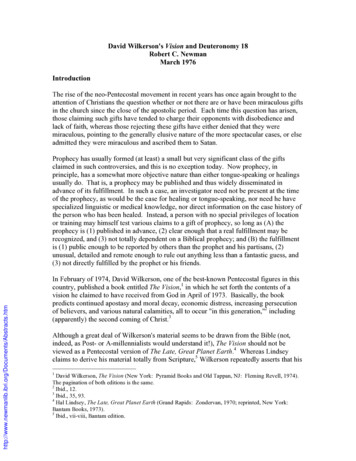
Transcription
David Wilkerson's Vision and Deuteronomy 18Robert C. NewmanMarch 1976IntroductionThe rise of the neo-Pentecostal movement in recent years has once again brought to theattention of Christians the question whether or not there are or have been miraculous giftsin the church since the close of the apostolic period. Each time this question has arisen,those claiming such gifts have tended to charge their opponents with disobedience andlack of faith, whereas those rejecting these gifts have either denied that they weremiraculous, pointing to the generally elusive nature of the more spectacular cases, or elseadmitted they were miraculous and ascribed them to racts.htmProphecy has usually formed (at least) a small but very significant class of the giftsclaimed in such controversies, and this is no exception today. Now prophecy, inprinciple, has a somewhat more objective nature than either tongue-speaking or healingsusually do. That is, a prophecy may be published and thus widely disseminated inadvance of its fulfillment. In such a case, an investigator need not be present at the timeof the prophecy, as would be the case for healing or tongue-speaking, nor need he havespecialized linguistic or medical knowledge, nor direct information on the case history ofthe person who has been healed. Instead, a person with no special privileges of locationor training may himself test various claims to a gift of prophecy, so long as (A) theprophecy is (1) published in advance, (2) clear enough that a real fulfillment may berecognized, and (3) not totally dependent on a Biblical prophecy; and (B) the fulfillmentis (1) public enough to be reported by others than the prophet and his partisans, (2)unusual, detailed and remote enough to rule out anything less than a fantastic guess, and(3) not directly fulfilled by the prophet or his friends.In February of 1974, David Wilkerson, one of the best-known Pentecostal figures in thiscountry, published a book entitled The Vision,1 in which he set forth the contents of avision he claimed to have received from God in April of 1973. Basically, the bookpredicts continued apostasy and moral decay, economic distress, increasing persecutionof believers, and various natural calamities, all to occur "in this generation,"2 including(apparently) the second coming of Christ.3Although a great deal of Wilkerson's material seems to be drawn from the Bible (not,indeed, as Post- or A-millennialists would understand it!), The Vision should not beviewed as a Pentecostal version of The Late, Great Planet Earth.4 Whereas Lindseyclaims to derive his material totally from Scripture,5 Wilkerson repeatedly asserts that his1David Wilkerson, The Vision (New York: Pyramid Books and Old Tappan, NJ: Fleming Revell, 1974).The pagination of both editions is the same.2Ibid., 12.3Ibid., 35, 93.4Hal Lindsey, The Late, Great Planet Earth (Grand Rapids: Zondervan, 1970; reprinted, New York:Bantam Books, 1973).5Ibid., vii-viii, Bantam edition.
2information comes directly from God. The Biblical quotations used in the front matter ofhis book implicitly compare Wilkerson's vision with those of Paul,6 Peter,7 Daniel8 andHabakkuk,9 while in the text proper he twice compares his vision with Noah's10 andsuggests from Acts 2:17 (citing Joel 2:28) that the Bible predicts just such visionstoday.11 On one occasion Wilkerson says, "I am not preaching now; I am prophesying."12I propose, therefore, to examine the question of miraculous gifts today in the light of thisclaimed prophetic revelation by an outstanding Pentecostal leader. Naturally, if it shouldappear that Wilkerson's claims do not stand careful scrutiny, it would not follow that allsuch claims are invalid. Yet it should serve to put both Pentecostals and non-Pentecostalson guard against credulity and presumption, and to remind us of our responsibility to "testall things, holding fast to that which is good" (1 Thess 5:21).Tests for a True ProphetBecause of the substantial authority which God gave to the OT prophets, there was acontinual temptation for someone to pretend to such a gift. Foreseeing this problem, Godestablished a death penalty for false prophecy in Deut 18:20. As the people wereapparently expected to enforce this punishment, the question naturally arose, "How do werecognize a false prophet?" God answered this question by providing two basic criteria.13The prophet must, first of all, agree with previous divine revelation on the subjects hediscusses. Thus Deut 13:1-5, for instance, warns against prophets who would seek tolead the believer to follow other gods. It should not be assumed that the prophet wouldnecessarily tell you that this is what he intends, for an entirely different religion may beconstructed around orthodox terminology. Recall that even when Israel worshiped thegolden calf in the wilderness, Aaron sought to represent the action as "a feast to the Lord"(Ex 32:5). In fact, Paul warns that even an apostle or angel should be considered hellbent if he brings a gospel that departs from God's provision of salvation by grace alone(Gal 1:8-9). This criterion places a heavy responsibility on every believer to know God'sword and to test all teaching by it.Yet there is always the possibility that we have misunderstood the Scripture at somepoint, so that a true prophet would naturally disagree with us on this matter. We should,therefore, be willing to give such a fellow the same sort of hearing we would like othersto give us when we point out their theological errors! That is, we should be willing to re-6Vision, 6.Ibid., 9.8Ibid.9Ibid., 7.10Ibid., 13, 96.11Ibid., 13.12Ibid., 68.13More detailed discussions of tests for true and false prophets may be found in the Zondervan PictorialEncyclopedia of the Bible, s.v., "Prophets and Prophecy," by Allan A. MacRae; and in J. Barton Payne,Encyclopedia of Biblical Prophecy (New York: Harper and Row, 1973), 59-91.7
3examine our own beliefs in the light of Scripture to see whether our view or his best fitsGod's word. Obviously the Pharisees would have done well to give Jesus such a hearing.The second criterion for a true prophet is the fulfillment of his predictions. Deut 18:22gives this test explicitly as God's answer to the people's question, "How will we know theword which the Lord has not spoken?"That which the prophet speaks in the name of the Lord and the word doesnot happen nor come about, that is the word which the Lord has notspoken. The prophet has spoken it in presumption; you shall not be afraidof him.Isaiah 44:24-28 shows us why this test will work. God promises us that He will makefools of false prophets, but that He will uphold the predictions of His true messengers.Thus one false prediction will prove that the prophet is not from God.Here, too, the Biblical criterion may not be as simple as it first appears. What aboutJonah's prophecy that Nineveh would be overthrown in forty days (Jonah 3:4)? Was itnot falsified by the events? Some interpreters have suggested that God will occasionallygive predictions of judgment which are actually conditioned by the repentance of therecipients, although the condition is not stated in order to make the presentation moreforceful. This is a possibility in Jonah's case, yet we should realize that we may not havethe complete text of his preaching to the Ninevites. For some reason Jonah feared (Jonah4:2) and the Ninevite king hoped (Jonah 3:6-9) that God's judgment would be averted ifthe people repented. In any case, it is not good exegetical methodology to allow aproblem passage which is capable of various interpretations to control the meaning of aclear and basis passage such as Deuteronomy 18, where the prophetic office is firstestablished. This is particularly so in view of God's statement in Isaiah 44 and theexamples of Micaiah (1 Kings 22:15-37, esp. v. 28) and Jeremiah (Jer 28, esp. vv. 15-17).Short-Range Prophecies in The VisionAs indicated above, all the prophecies in The Vision are claimed to be short-rangepredictions in the sense that all are to happen "in this generation"; yet some of thestatements include even shorter time-indications. Several have the phrase "in the nextdecade" attached to the prediction. For instance: I see great riots coming to many major cities in South American. In thenext decade, South America will become a powder keg, exploding in alldirections.14Regarding the weather, Wilkerson says:Nature will unleash its fury with increasing intensity over the next decade.There will be short periods of relief, but almost every day mankind will14Vision, 26-27.
4witness the wrath of nature somewhere in the world. Those recordbreaking changes will be above and beyond anything experienced in thepast.15After speaking of "floods, hurricanes, tornadoes," bad flying conditions, "the most violentwinters of all times," earthquakes, and epidemics, he continues:The drastic weather changes that are coming in the next decade will bringwith them violent hailstorms of unbelievable proportions. Large chunksof ice will fall from the sky and cause much damage. The storms will notonly destroy crops and smash automobiles, but they will also cause thedeath of many people.16These events are quite explicit and should form an excellent test for Wilkerson's Vision.There is a slight ambiguity in the term "next decade," however. Does he mean within tenyears of the vision (i.e., by April, 1983) or does he mean we are in the decade of the1970s, so the events will occur in the 1980s (before 1990)?Another prophecy is to be fulfilled "soon." In the context of a book which says –Parts of this vision will come to pass in the very near future. Some of theevents are more distant. But I believe all the events mentioned willhappen in this generation!17– "soon" would seem to be within a few years or a decade. The prophecy in question is:The United States is going to experience, in the not-too-distant future, themost tragic earthquake in its history. One day soon this nation will bereeling under the impact of the biggest news story of modern times. It willbe coverage of the biggest, most disastrous earthquake in history.18On the same page, Wilkerson says it will be far worse than the San Francisco earthquake,and it probably will not occur in California.19 This prophecy, too, should be easilytestable.Other prophecies speak of events occurring in "the next few years." Since "few" means"not many," "a small number,"20 these events would seem to be very close, presumablywell within ten years. Thus:15Ibid., 36.Ibid., 39.17Ibid., 12.18Ibid., 32.19Ibid.20Webster's Third New International Dictionary, 843.16
5Floods, hurricanes, tornadoes, and hailstorms will occur more frequently.More than one-third of the United States will be designated a disaster areawithin the next few years.21It is one of these "next few years" predictions that gives us the only passage in The Visionwhich can with some assurance be falsified already at the time of writing of this paper(March, 1976). In his first chapter, "Economic Confusion," Wilkerson titles the secondsection "A Few Good Years to Prepare." There he says:In spite of all the danger signs around us of impending economic disaster,the next few years (from 1973) will be among the most prosperous in thehistory of mankind.22We have already examined the meaning of the adjective "few" above, but it is alsoimportant to consider the adverb "next" which here modifies "few." According toWebster's Dictionary, "next" means "in the time, place or order nearest or immediatelysucceeding."23 Thus, the small number of years immediately following 1973 should be"among the most prosperous in the history of mankind." Let us look at various economicindicators for the period since April 1973 to see whether or not this is so.The Economic Situation since April 1973One of the most important economic indicators in our country is the condition of priceson the stock exchange. There are several formulae which have been designed to reflectthis condition. The Dow-Jones Industrial Average is one such formula, and it is givenbelow (figure 1) for the years 1934 through 1975.Figure 1:Dow-JonesIndustrialAverage 19341975. Source:Moody'sHandbook ofCommonStocks (Winter,1976), p 27a.21Vision, 35.Ibid., 16.23Webster's Third New International Dictionary, 1524.22
6Notice that from the beginning of 1973 to the end of 1974, the Dow-Jones average fellfurther than it has ever fallen in its entire history, from well over 1000 to less than 600! Itis true that the percentage decrease is not as severe as in the Great Depression, but therehas been nothing comparable since then. Nor is this a peculiarity of this one formulaalone. The other major stock market indices, Standard and Poor's Average of 500Stocks,24 the New York Stock Exchange Composite Index,25 and the American StockExchange Market Value Index,26 give the same picture. So far, the next few years from1973 have been very bad at the stock exchange.Of course, not everyone trades on the stock exchange, but problems there usually meanbankruptcies and production cutbacks which affect the wage-earner also.Figure 2: Wholesale Prices, Cost of Living Index, and Total IndustrialProduction on scale 1967 100. Data from Standard and Poor'sSecurity Owner's Stock Guide 30, no. 1 (Jan 1976), 258.As figure 2 indicates, industrial production since April, 1973 has declined noticeably,while wholesale prices and the cost of living indicate that inflation has begun to rise evenmore rapidly than in the preceding years. This has resulted in a serious unemploymentproblem in 1974 and 1975, with more than twice as many people out of work at the endof 1975 than at the end of 1973. See figure 3, below. So far, the few years following1973 have been bad for both the worker and his employer.Even though the total personal income in the United States has continued to rise steadily,and most persons with jobs are getting more pay than ever before, the
David Wilkerson's Vision and Deuteronomy 18 Robert C. Newman March 1976 Introduction The rise of the neo-Pentecostal movement in recent years has once again brought to the attention of Christians the question whether or not there are or have been miraculous gifts in the church since the close of the apostolic period. Each time this question has arisen, those claiming such gifts have
